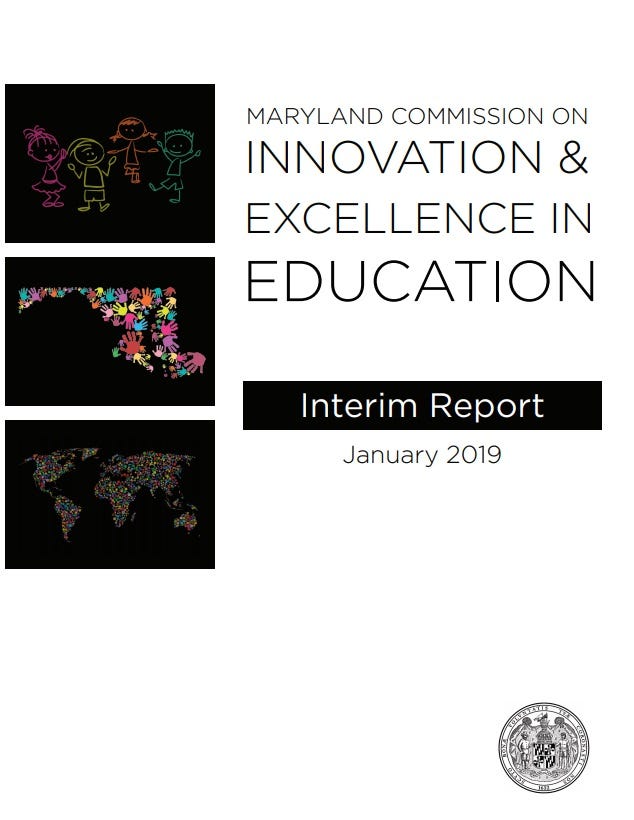Kirwan Report Released
And other legislative updates in this week’s Up the Street

THIS WEEK IN ANNAPOLIS
MSEA Officially Announces March for Our Schools
On Wednesday, MSEA President Cheryl Bost was joined by dozens of educator leaders and public education advocates in officially announcing the March for Our Schools. The press conference, held at MSEA’s headquarters, drew extensive coverage and helped get out the word about the upcoming event. You can watch video of it here.
President Bost said at the announcement, “Across this country, we have seen teachers, educators, and parents unifying their voices at state and city capitals in a call for fair pay and increased support for their students. We are proud to bring that movement here to Maryland.”
She was joined by EASMC President Jill Morris and MSEA Board Member Dr. Donna Christy, who spoke about the importance of ESP living wages and manageable school counselor and psychologist staffing ratios.
Baltimore Teachers Union President Marietta English and Maryland Association of Boards of Education Legislative Committee Chair Julie Hummer also gave remarks in announcing the march. Several other groups helping to organize the March for Our Schools joined us for the announcement, including: the ACLU of Maryland, Action in Montgomery, Advocates for Children and Youth, BUILD Baltimore, League of Women Voters, Maryland Association for the Education of Young Children, and Strong Schools Maryland.
REMINDER: Sign Up for March for Our Schools

Based on initial RSVP counts, we’ve now gone public with our projection of 5,000 or more attendees for the March for Our Schools on March 11. But we don’t just want to reach that goal — we want to blow past it. Help us beat our goal and RSVP here and then recruit five or more of your friends today.
MSEA Advocates for ESP Living Wage before Ways and Means
Yesterday, legislation (HB 479) to create a living wage floor for education support professionals was presented before the House Ways and Means Committee by bill sponsor Del. Eric Ebersole (D-Baltimore and Howard-District 12). MSEA President Cheryl Bost, EASMC President Jill Morris, and WCESPA President Ivory Smith testified as a panel in strong support of the bill and made a compelling case for why all public servants who dedicate their lives to helping students should at the very least be able to provide for their own families. According to the Department of Legislative Services, 24,670 education support professionals make below a living wage across the state.
The bill would set a minimum annual salary for school employees at $31,500 in lower cost of living counties and $36,000 in higher cost of living counties by July 2024. That floor would be phased in over three years. This, of course, does not restrict collective bargaining but merely creates a required minimum standard. Salaries can continue to be negotiated above that floor. But it does create a standard, based on cost of living calculations, to ensure all school employees can support their families on school-based compensation without taking on additional jobs.
House Passes Bill to Add Two Teachers to State Board of Education
Last week, we wrote about legislation (HB 87) moving through the House of Delegates to add two certified teachers — selected through an election of their peers — and one parent to the State Board of Education. One of the two teachers must come from primary grade levels while the other must come from secondary grade levels to ensure all perspectives are represented on the board.
The bill came out of committee and onto the House floor on Wednesday, where several Republican amendments to weaken the bill were defeated. It was further debated this morning and received passage after a 98–40 vote in support. The bill now moves to the Senate, where it had a bill hearing before the Senate Education, Health, and Environmental Affairs Committee earlier this week.
NEWS AND NOTES
Kirwan Commission Releases Interim Report
The Kirwan Commission released their interim report yesterday, a few weeks following their final meeting to discuss policy recommendations and cost estimates. The report details their plan to close the nearly $3 billion shortfall in pre-K-12 education funding by the 2022–2023 school year and ultimately boost school funding by $3.8 billion by 2029–2030. It also includes, as anticipated, an ask of the governor and legislature to begin moving on implementation by increasing state school funding by $325 million in this year’s budget (FY2020) and $750 million in next year’s budget (FY2021). You can read all 243 pages of the report here (probably not all at once)!
The report also includes statements from individual Commission members, including our representative, MSEA Executive Director David Helfman. He wrote in part, “We have withstood efforts, especially from those who have never worked in a public school, to reduce our work to test scores and take away our autonomy over curricula and teaching methods. We have withstood flat funding while our voices in decision-making have been diminished. We see the work of the Commission as a welcome new direction, one that focuses on how to empower educators to improve our public schools.” He also cited some areas of concern on several recommendations as noted in this Maryland Matters story.
Hogan Appoints Former State Senator Gail Bates to State Board of Education
This morning, Gov. Hogan continued his pattern of appointing school privatization advocates to the State Board of Education by appointing former Republican State Senator Gail Bates as its newest member. Bates, who represented District 9 in Carroll and Howard Counties, was just defeated in her bid for re-election in November by Democratic Sen. Katie Fry Hester (D-Carroll and Howard-District 9).
During her time in the General Assembly, Gates took many anti-public education votes and was a vocal advocate for private school vouchers. She voted against the 2017 Protect Our Schools Act, legislation that has prevented Hogan’s state school board from privatizing schools based on test scores, as well as the bill last year to put two current teachers and a parent on the State Board of Education. She is now subject to a Senate confirmation process.
Hogan also appointed Clarence Crawford, a pastor at The Gateway to Wholeness Church Ministries in Prince George’s County. If confirmed, Crawford will join several religious leaders already on Hogan’s State Board of Education as it continues to look more and more like a religious private school board.
Maryland Lawmakers Explore Boost to School Construction
A story in Maryland Matters this week detailed ongoing work by House Appropriations Chair Maggie McIntosh and other House leaders to make progress on the state’s growing school construction needs statewide. There are more than a dozen bills introduced this session seeking more funding — some are district-specific and some are statewide — to address overcrowded and aging school buildings.
In response to Gov. Hogan’s proposal to use Education Trust Fund money — newly secured through the successful Fix the Fund ballot initiative — to provide $125 million more in annual school construction funding over five years, House Majority Leader Kathleen Dumais (D-Montgomery-District 15) has introduced legislation (HB 727) to provide that amount of funding without dipping into casino gaming revenue. That is important because the legislature is planning to use the Education Trust Fund dollars to help implement the Kirwan Commission recommendations. We will follow the advancement of these conversations and report back as we move forward.

